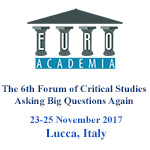Euroacademia Conferences
 Europe Inside-Out: Europe and Europeanness Exposed to Plural Observers (9th Edition) April 24 - 25, 2020
Europe Inside-Out: Europe and Europeanness Exposed to Plural Observers (9th Edition) April 24 - 25, 2020 Identities and Identifications: Politicized Uses of Collective Identities (9th Edition) June 12 - 13, 2020
Identities and Identifications: Politicized Uses of Collective Identities (9th Edition) June 12 - 13, 2020 8th Forum of Critical Studies: Asking Big Questions Again January 24 - 25, 2020
8th Forum of Critical Studies: Asking Big Questions Again January 24 - 25, 2020 Re-Inventing Eastern Europe (7th Edition) December 13 - 14, 2019
Re-Inventing Eastern Europe (7th Edition) December 13 - 14, 2019 The European Union and the Politicization of Europe (8th Edition) October 25 - 26, 2019
The European Union and the Politicization of Europe (8th Edition) October 25 - 26, 2019 Identities and Identifications: Politicized Uses of Collective Identities (8th Edition) June 28 - 29, 2019
Identities and Identifications: Politicized Uses of Collective Identities (8th Edition) June 28 - 29, 2019 The European Union and the Politicization of Europe (7th Edition) January 25 - 26, 2019
The European Union and the Politicization of Europe (7th Edition) January 25 - 26, 2019 7th Forum of Critical Studies: Asking Big Questions Again November 23 - 24, 2018
7th Forum of Critical Studies: Asking Big Questions Again November 23 - 24, 2018 Europe Inside-Out: Europe and Europeanness Exposed to Plural Observers (8th Edition) September 28 - 30, 2018
Europe Inside-Out: Europe and Europeanness Exposed to Plural Observers (8th Edition) September 28 - 30, 2018 Identities and Identifications: Politicized Uses of Collective Identities (7th Edition) June 14 - 15, 2018
Identities and Identifications: Politicized Uses of Collective Identities (7th Edition) June 14 - 15, 2018
Rethinking China’s Revolutionary Identity in Transformation: Memory, Reflection, and Cultural Politics
-
-

-
Presentation speakers
- Mengqian Yuan, Nanjing University, China
- Chu-Jie Chen, Sun Yat-sen University, Guangzhou, China
Abstract:
The ambivalent pattern of China’s transformation created an intractable identity crisis triggered by the collapse of the utopian vision of the socialist world and the reorientation of the new collective imaginary. While the Cultural Revolution (CR) was officially condemned, how to reconstruct the collective memory of the specific history has become a sensitive and profound ideological rupture in post-socialist China. Taking the memory of a former Red Guard Qian Li who committed revolutionary violence during the CR as a case, this research employs the methods of oral history and discourse analysis to examine the following issues: which traumatic memory Mr. Li has experienced and how he has witnessed the history; how he has expressed his regret and reflection on the collective violence of the Red Guards; what the meanings of the cultural politics have been constructed through the practice of memory and reflection. First, this paper argues that the reflective discourse on revolutionary violence has formed the symbolic extension of Mr. Li’s trauma, and the process of narrating his life stories has articulated individual life experience and collective historical reflection to recover trauma and to produce new social action facing reality and future. Second, this paper also highlights that the approach of moralizing rather than historicizing the violence of the CR has usually obscured its political, social and cultural factors, leading to a new mechanism of discrimination and oppression. Finally, this paper emphasizes the political and cultural significance of the counter-memory practice which could not only revive the forgotten and marginalized memories of the CR, but also engage with historical and contemporary criticism, and actively raise the awareness of the ordinary people to speak their histories and to participate in current cultural politics. Overall, this research would illuminate the dynamic process of the transformation of revolutionary identity in post-socialist China.
-
Related Presentations

Post-Truth, Relativism and Music
- Wolfgang Marx

From the SGP to the TSCG through the Lenses of European Integration Theories
- Ariane Aumaitre Balado

Troublemakers: The Good, the Bad, and the Ugly
- Tyler Denmead

Eternal Rebirth: The Difficult Development of Urban Identity Between Destruction, Reconstruction and New Formal Layouts - The Case of Argenta (Ferrara, Italy)
- Enrico Pietrogrande
- Andreina Milan













